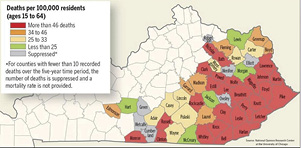Map shows opioid deaths by county, Clinton among highest

By Heather Chapman, Kentucky Health News
A new data visualization tool offers in-depth, county-by-county information about the impact of the opioid epidemic in Appalachia and how it relates to factors such as unemployment, poverty, education and disability.
The Appalachian Overdose Mapping Tool, developed by a research organization and the Appalachian Regional Commission, “integrates overdose mortality rates for each Appalachian county with data on unemployment, poverty, and disability, as well as other socioeconomic variables. Users can compare county-level information with regional and national data and see changes in the data between 2006–2010 and 2011–2015. The mapping tool can also generate fact sheets to assist in community planning and response efforts,” Wendy Wasserman of ARC reports in a press release.
“Residents across Appalachia are 55 percent more likely to die from a drug overdose than people in the rest of the country, but the disparity is even higher in some Eastern Kentucky counties.
In Leslie County, for instance, the overdose death rate is five times the national average,” Bill Estep reports for the Lexington Herald-Leader. Leslie’s rate is the highest in Kentucky; four West Virginia counties had higher rates.
Socioeconomic correlations shown by the interactive map include:
In Central Appalachia, counties with the highest rates of overdose are often the same counties with the highest rates of people on disability.
In Central Appalachia, the counties with the highest overdose rates are often the same counties with the lowest rates of educational attainment.
In Northern and Southern Appalachia, the highest overdose rates are in urban counties.
While Central Appalachia remains the most highly affected subregion of Appalachia, other subregions are experiencing increasing rates of overdose.
The map was developed by ARC and the University of Chicago’s NORC, which was known as the National Opinion Research Center before its work expanded beyond opinion research.



